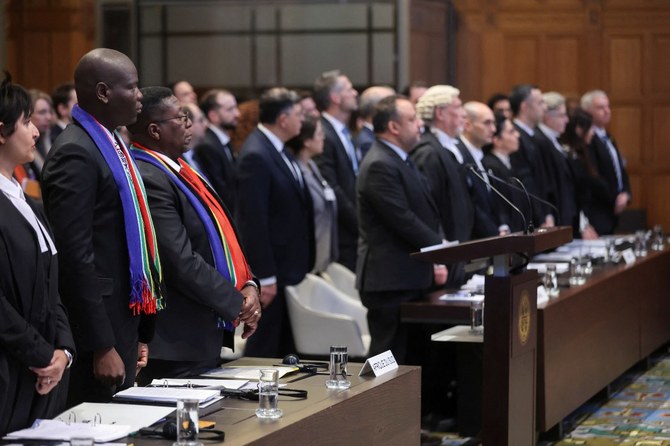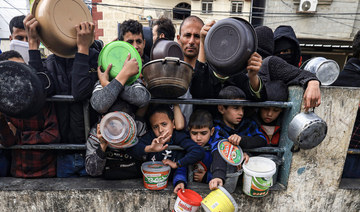THE HAGUE: South Africa asked the World Court on Thursday to order Israel to immediately suspend its military operation in Gaza, where it says Israel is committing genocide against Palestinian civilians. The demand came at the closing of the first day of hearings of a case brought by South Africa against Israel at the UN's top court. Israel will respond to the allegations on Friday.
Israel faced accusations at the World Court on Thursday of genocide in its war in Gaza, as the first residents returned to northern areas where Israeli forces have begun withdrawing, leaving behind scenes of total devastation.
Three months of Israeli bombardment has laid much of the narrow coastal enclave to waste, killing more than 23,000 people and driving nearly the entire population of 2.3 million Palestinians from their homes. An Israeli blockade has sharply restricted supplies of food, fuel and medicine, creating what the United Nations describes as a humanitarian catastrophe.
Israel says its only choice to defend itself is by eradicating Hamas, the Islamist group that rules Gaza, whose fighters sworn to Israel’s destruction stormed through Israeli communities on Oct. 7, killing 1,200 people and capturing 240 hostages. Israel blames Hamas for all harm to civilians for operating among them, which the fighters deny.
The case, brought by South Africa at the International Court of Justice in the Hague, accuses Israel of violating the 1948 genocide convention, enacted in the wake of the mass murder of Jews in the Holocaust, which mandates all countries to ensure such crimes are never repeated.
Israeli government spokesperson Eylon Levy compared the lawsuit to a centuries-old antisemitic conspiracy theory falsely accusing Jews of killing babies for rituals: “The State of Israel will appear before the International Court of Justice to dispel South Africa’s absurd blood libel, as Pretoria gives political and legal cover to the Hamas rapist regime.”
South africa likens the gaza strip to a concentration camp in its world court case
A lawyer representing South Africa’s legal team has called the Gaza Strip “a concentration camp where genocide is taking place.”
John Dugard made the remarks while he was laying out a case in front of the International Court of Justice Thursday that South Africa has jurisdiction to take Israel to court over the genocide charge. He was repeating remarks made in 2023 by South African President Cyril Ramaphosa.
The genocide charge strikes at the heart of Israel’s national identity and such comparisons of Israel’s war in Gaza to Nazi concentration camps on a world stage are likely to stir emotions in Israel, which sees itself as a bulwark of security for Jews after 6 million were killed in the Holocaust. International support for Israel’s creation in 1948 was deeply rooted in outrage over Nazi atrocities.
South Africa wants the court to rule that Israel is committing genocide in its war against Hamas in the Gaza Strip. Israel denies the charges, saying it is fighting a war of self-defense following Hamas’ deadly Oct. 7 attack.
Lawyer for South Africa tells the world court that Palestinians have nowhere safe to go
A lawyer representing South Africa’s legal team says Palestinians under Israeli bombardment have nowhere safe to go.
In her address Thursday to the International Court of Justice in The Hague, Adila Hassim said Palestinians in Gaza “are killed in their homes in places where they seek shelter, in hospitals, in schools or in mosques, in churches.” She said Palestinians have been killed if they did not follow Israeli orders to evacuate, but also if they evacuated to Israeli-designated safe corridors.
“The level of killing is so extensive that those whose bodies are found buried in mass graves often unidentified,” Hassim said.
South Africa is trying to prove to the court that Israel is committing genocide in its war against Hamas in Gaza. Israel vehemently denies the allegation, saying it is battling militants in a war of self-defense after Hamas’ deadly Oct. 7 attack.
Amer Salah, 23, sheltering in a UN school in the Southern Gaza Strip after fleeing his home, told Reuters Gazans hoped the case would at last bring to bear international pressure forcing Israel to halt the war.
“Israel has always been a state above the law. They did what they did in Gaza because they knew they couldn’t be punished as long as America was on their side. It is time to change that,” he said.
“We salute South Africa, and we want the war to be stopped and the court can do that.”
The preliminary hearings this week will consider whether the court should order Israel to stop fighting while it investigates the full merits of the case.
South African President Cyril Ramaphosa said his country was driven to bring the case by “the ongoing slaughter of the people of Gaza,” motivated by South Africa’s own history of apartheid.
The United States said Israel must do more to reduce civilian casualties, but called the genocide allegations “unfounded.”
“In fact, it is those who are violently attacking Israel who continue to openly call for the annihilation of Israel and the mass murder of Jews,” said State Department spokesperson Matt Miller.
Hamas official Sami Abu Zuhri told Reuters: “We urge the court to reject all pressure and take a decision to criminalize the Israeli occupation and stop the aggression on Gaza.”
“A failure to achieve justice, a failure in the role of the court, would mean that the occupation will continue its war of genocide against the Palestinian people in Gaza.”
’Gaza will be rebuilt. We will rebury our dead’
Since the New Year, Israel has announced a new phase in the war, saying it will begin drawing down forces in the northern half of the Gaza Strip where its offensive began in October.
Even so, fighting has only intensified in southern areas, where Israel extended its ground campaign last month and where nearly all Gazans have sought shelter. The Israeli military said its main campaign was now in the biggest southern city, Khan Younis.
The relative quiet in the north has allowed a small number of residents to begin trickling back into obliterated cities, finding a moonscape often with no trace of where homes once stood.
Yousef Fares, a freelance journalist, filmed himself walking through a wasteland surrounded by scorched ruins that was once a part of Gaza City, home to nearly a million people. A few civilians were making their way through, some wobbling on bicycles over a track across the mud.
“All the houses you see are destroyed, completely or partially,” he said.
“We are now at the Tuffah old cemetery, which is over 100 years old. All those graves were exhumed, they were run over by the Israeli bulldozers and tanks. People are coming from various areas of Gaza City to search for the bodies of their sons.”
Abu Ayesh, who returned to a nearby part of Gaza City, told Reuters by phone that the destruction was “earthquake-like.” “I tell (Israeli Prime Mininster Benjamin) Netanyahu that Gaza will be rebuilt, we will build our homes and we will rebury our dead.”
Netanyahu: no intention to re-occupy Gaza
While Washington has backed Israel’s military campaign as justified by its right to self-defense, it has also called on its ally to scale the war back, do more to protect civilians, and maintain the hope of a future independent Palestinian state.
This week, Secretary of State Antony Blinken visited the region, meeting Israeli and Palestinian officials and leaders of neighboring Arab States, defending Israel’s campaign to eradicate Hamas but pushing for it to work with the Palestinian Authority (PA), which recognizes Israel.
Israel has been vague about its ultimate intentions but says it wants security control of Gaza indefinitely and won’t hand it to the PA, which exercises limited self rule in the Israeli occupied West Bank but was pushed out of Gaza in 2007 by Hamas.
Some far-right members of Netanyahu’s coalition government have openly called for Palestinians to leave Gaza and Israelis to settle there permanently. In a post on X, Netanyahu insisted this was not Israel’s aim.
“I want to make a few points absolutely clear: Israel has no intention of permanently occupying Gaza or displacing its civilian population,” he wrote. “Israel is fighting Hamas terrorists, not the Palestinian population, and we are doing so in full compliance with international law.”






















